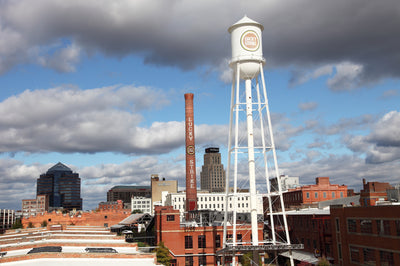**Updated June 11, 2021 to include most recent data
Emma Schultz, M.S. | Scientific Contributor
Our Water Nerds have updated our analysis of Durham, North Carolina drinking water to include the most updated data. Our team has aggregated water quality test data from the City of Durham Department of Water Management, the U.S. Environmental Protection Agency (EPA), as well as from samples that we collect and analyze. We cross reference these data with toxicity studies in the scientific and medical literature, and look at upcoming regulatory changes. The water filters that we sell in Durham are optimized with these issues in mind.
Source Of Durham Drinking Water
Durham gets its drinking water from surface water sources. The two primary sources are Lake Michie and Little River Reservoir. Supplementary water is supplied by Jordan Lake and Teer Quarry. The two treatment plants in Durham are the Williams Water Treatment Plant and the Brown Water Treatment Plant.
PFAS In Durham Drinking Water
Per and Polyfluoroalkyl Substances or PFAS are a category of chemicals found in various non-stick/stain resistant products, as well as fire fighting foam. PFAS are considered to be "emerging contaminants" because they are not currently regulated by EPA, but are known to be toxic, carcinogenic, and persistent in the environment. High levels of PFAS have been detected throughout the entire state of North Carolina, specifically in Durham. Most municipalities don't test for or remove PFAS from tap water, and most water filters are not designed to remove PFAS. A recent study by Duke University and NC State University revealed elevated levels in of a variety of PFAS compounds in Durham tap water.
Lead In Durham Drinking Water
Lead enters Durham drinking water through older lead service pipes and lead-containing plumbing. When corrosion control measures fail (such as in Flint, Michigan), lead leaches into drinking water and reaches toxic levels. Recent analysis for lead in Durham tap water found 90th percentile concentrations of .003 parts per billion. Although the Action Level for lead is 15 ppb, both the EPA and CDC recognize that there is no such thing safe levels of lead. Of course, federal regulations cannot take into account levels measured at an individual tap.
Disinfection Byproducts (DBPs) In Durham Drinking Water
DBPs are a category of emerging contaminants formed when chlorine-based disinfectants combine with naturally-occurring organic matter. While these chemicals are not well regulated, the EPA has explicitly stated that they are linked to an increased risk of bladder cancer, as well as kidney, liver, and central nervous system problems. Both regulated types of DBPs (total trihalomethanes and haloacetic acids 5) are elevated in Durham drinking water.
Use Of Chloramine In Durham Tap Water
While many cities use chlorine as their primary disinfectant, Durham’s water is disinfected with chloramine, made by combining chlorine and ammonia. Chloramine is the frequent culprit when customers report a “bad taste” in their tap water, and unlike chlorine will not fade away if left in the fridge overnight. The recent chloramine running annual average for Durham was 2 parts per million. Most one-size-fits-all water filters use filtration media that don’t adequately remove chloramine, but the filters that Hydroviv builds for Durham use special filtration media that are purpose-built to remove chloramine as well.
Still Have Questions About Durham’s Tap Water?
Hydroviv is a water filtration company that uses water quality data to optimize water filters for each city’s water. The chemicals that we list above are what we consider to be “points of emphasis” so we can build the best water filter for Durham tap water, but all of our water filters provide broad protection against other contaminants commonly found in drinking water (e.g. VOCs, heavy metals [including lead], pharmaceuticals, solvents, pesticides, mercury).
If you’re interested in learning more about water filters that have been optimized for Durham tap water, feel free to visit www.hydroviv.com, reach out by email (hello@hydroviv.com) or through our live chat. We also frequently post water-related news on Twitter or Facebook.
Please Share This City of Durham Water Quality Article On Social Media With Anyone You Think Would Benefit From The Information!
Recommended Articles For You
What Should I Know About Lead Contamination And Lead Poisoning?What Do I Need To Know About Disinfection Byproducts?
Why Does EPA Allow Toxic Chemicals In Drinking Water?
Are TDS Meters Are A Marketing Gimmick?



